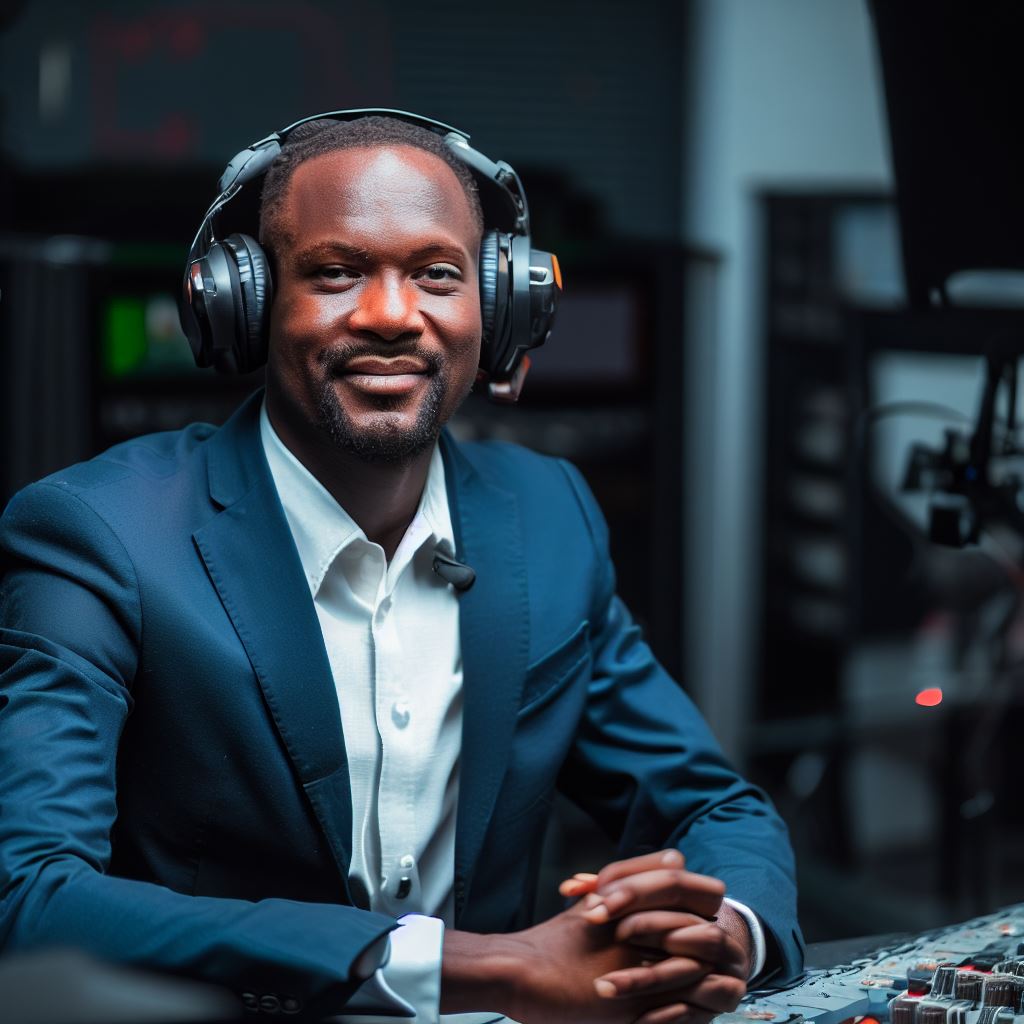Introduction
Let’s explore work-life balance for radio sports producers in Nigeria.
Work-life balance refers to the equilibrium between work obligations and personal life, allowing individuals to prioritize their well-being and maintain a fulfilling lifestyle.
In Nigeria, the radio sports industry plays a crucial role in keeping the population engaged and updated about sporting events and news.
Work-life balance is the ability to effectively manage work responsibilities while also maintaining a healthy personal life. It is essential for overall well-being, mental health, and job satisfaction.
Achieving work-life balance helps prevent burnout, enhances productivity, fosters better relationships, and improves overall quality of life.
The radio sports industry in Nigeria is a dynamic sector that provides comprehensive coverage of various sports, including football, basketball, athletics, and more.
Radio sports producers are responsible for creating and delivering engaging sports content, facilitating interviews with athletes, and providing real-time commentary during live events.
In a fast-paced and demanding industry, finding work-life balance is crucial for the well-being and effectiveness of radio sports producers.
Ensuring proper work-life balance allows these professionals to devote time to personal interests, hobbies, and relationships, leading to increased job satisfaction and overall happiness.
In the following sections, we will explore strategies, challenges, and potential solutions for radio sports producers in Nigeria to achieve a healthy work-life balance.
Challenges faced by radio sports producers in Nigeria
In the fast-paced world of radio sports production in Nigeria, there are numerous challenges that professionals face on a daily basis.
These challenges significantly affect their work-life balance, making it important to understand and address them. In this section, we will discuss the challenges faced by radio sports producers in Nigeria.
Demanding work schedules
- Radio sports producers in Nigeria often have long working hours, including weekends and holidays.
- They are required to follow the schedule of sporting events, which can be unpredictable and demanding.
- The nature of their job requires them to be available during live matches, even if it means working late at night.
High pressure and tight deadlines
- Radio sports producers are constantly under pressure to deliver high-quality content in a limited amount of time.
- They have to meet tight deadlines for preparing pre and post-match analysis, interviews, and commentary.
- The fast-paced nature of the industry adds to the pressure, leaving little room for errors or delays.
Limited personal time due to the nature of the job
- Radio sports producers in Nigeria often have to sacrifice personal time due to the demanding nature of the job.
- They may miss out on important family events, social gatherings, or personal commitments due to work commitments.
- The unpredictable schedule of sporting events further limits their personal time, leaving them with little time for rest and relaxation.
Despite these challenges, it is important to recognize the passion that drives radio sports producers in Nigeria.
They are dedicated to their craft and strive to deliver the best possible content to their audience.
However, it is crucial to address these challenges and promote a healthier work-life balance.
Ways to which radio sports producers can overcome these challenges
To overcome these challenges, radio sports producers in Nigeria can:
- Prioritize time management: They should create a schedule that allows them to allocate time for work, personal life, and self-care.
- Delegate tasks: Producers can delegate certain responsibilities to their team members, allowing them to share the workload and reduce pressure.
- Set realistic expectations: It is important for producers to communicate and negotiate realistic deadlines and work expectations with their employers and colleagues.
- Take breaks and rest: Radio sports producers should make it a priority to take breaks during their busy schedules to relax and rejuvenate.
- Seek support: They can reach out to colleagues or mentors for advice and support, as they understand the unique challenges faced in the industry.
- Communicate boundaries: Producers should establish boundaries with their employers and colleagues to ensure a better work-life balance.
In fact, radio sports producers in Nigeria face numerous challenges that significantly impact their work-life balance.
It is important for individuals and organizations within the industry to address these challenges and prioritize the well-being of its professionals.
By incorporating strategies such as effective time management, delegation, and setting realistic expectations, radio sports producers can achieve a healthier work-life balance and continue to excel in their field.
Read: The Impact of Technology on Sports Radio in Nigeria
Strategies for achieving work-life balance
Achieving work-life balance can be challenging, especially for radio sports producers in Nigeria.
The demanding nature of their work, long hours, and tight deadlines can often lead to an imbalance between work and personal life.
However, with the right strategies and mindset, it is possible to maintain a healthy balance between the two.
Time management techniques
Proper time management is crucial for achieving work-life balance.
By prioritizing tasks, producers can focus on the most important ones and avoid wasting time on less significant activities.
Additionally, setting boundaries and sticking to them helps establish a clear separation between work and personal life.
Producers should learn to say no to unnecessary work commitments that can encroach on their personal time.
Delegating tasks to colleagues when necessary can also lighten the workload and create more time for personal activities.
Creating a supportive work environment
A supportive work environment plays a vital role in promoting work-life balance.
Open communication with supervisors and colleagues allows producers to express their needs and concerns.
This can lead to adjustments in schedules or workload distribution to accommodate personal commitments.
Encouraging teamwork and collaboration fosters a sense of shared responsibility and can help distribute tasks more effectively.
Promoting a healthy work culture, such as emphasizing the importance of work-life balance, can also create a positive and supportive atmosphere.
Self-care practices
Taking care of oneself is essential for achieving work-life balance.
Physical health should not be neglected, and producers should make time for regular exercise and maintain a proper diet.
Engaging in physical activities outside of work can help reduce stress and improve overall well-being.
Equally important is managing mental health.
Producers should learn stress management techniques such as meditation, deep breathing exercises, or seeking professional help when needed.
Finally, finding hobbies and activities outside of work can provide a much-needed escape and help recharge both physically and mentally.
In general, work-life balance is achievable for radio sports producers in Nigeria by implementing strategies in time management, creating a supportive work environment, and practicing self-care.
By prioritizing tasks, setting boundaries, and delegating when necessary, producers can make the most of their work hours.
Open communication, teamwork, and promoting a healthy work culture contribute to a supportive environment.
Finally, taking care of physical and mental health through exercise, stress management techniques, and engaging in hobbies outside of work is crucial for a balanced and fulfilling life.
Read: Advancing Your Career in Radio Sports Production

Gain More Insights: Women in Sports Agency in Nigeria: Breaking the Mold
Tips for radio sports producers specific to Nigeria
Work-life balance is crucial for radio sports producers in Nigeria.
To thrive in this demanding field, it is important to utilize local resources and technology effectively while understanding the cultural context.
Utilizing local resources and technology
Accessing reliable internet and equipment
In today’s digital age, internet connectivity is vital for radio sports producers.
It allows them to research, communicate, and gather real-time sports information efficiently.
Therefore, investing in reliable internet services and high-quality equipment is imperative for optimal performance.
Connecting with relevant professional networks
Building relationships with local sports organizations, journalists, and experts is beneficial for radio sports producers in Nigeria.
These networks provide opportunities for collaboration, access to exclusive interviews, and valuable insights into the local sports scene.
Understanding the cultural context
Balancing work obligations with cultural traditions
Nigeria is a culturally diverse country with various traditions and festivals.
As a radio sports producer, it is important to strike a balance between work commitments and cultural obligations.
This may involve scheduling work around important cultural events or finding creative ways to incorporate cultural elements into sports programming.
Recognizing and respecting local customs and norms
Nigerian society has its own set of customs and norms.
Radio sports producers should take the time to understand and respect these cultural aspects.
It is crucial to avoid content that may offend or alienate the local audience.
By incorporating Nigerian culture into their broadcasts, producers can create a connection with listeners and foster a sense of belonging.
In review, radio sports producers in Nigeria need to prioritize work-life balance.
By utilizing local resources and technology effectively and understanding the cultural context, they can create engaging and culturally relevant content.
This not only enhances their professional growth but also strengthens their connection with the Nigerian audience.
Read: Networking for Radio Sports Producers in Nigeria
Case studies and success stories
Examples of radio sports producers in Nigeria who have successfully achieved work-life balance
- Nnamdi, a radio sports producer, manages his workload effectively by setting boundaries between work and personal life.
- Jasmine, another radio sports producer, prioritizes self-care activities such as exercise and meditation to maintain balance.
- Chinedu, a seasoned radio sports producer, believes in delegating tasks and effectively managing his team to avoid burnout.
Insight into their strategies and lessons learned
Nnamdi emphasizes the importance of setting clear boundaries at work, such as scheduling breaks and maintaining a strict work schedule.
He also believes in effective communication with colleagues and superiors to manage expectations.
Jasmine, on the other hand, focuses on self-care activities to maintain balance.
She acknowledges that taking care of oneself enhances productivity and reduces the chances of burnout.
Jasmine also believes in saying “no” to additional work if it jeopardizes her work-life balance.
Chinedu, with his extensive experience, highlights the significance of delegation.
By effectively managing his team and assigning tasks according to their strengths, he ensures that the workload is evenly distributed, preventing him from being overwhelmed.
Chinedu also prioritizes regular breaks and vacations to recharge.
The success stories of these radio sports producers highlight important lessons for achieving work-life balance:
- Set boundaries: Clearly define work and personal life, establish a set schedule, and communicate expectations.
- Self-care: Prioritize activities that promote well-being, such as exercise, meditation, and hobbies, to maintain balance.
- Delegate: Effectively manage teams and assign tasks based on strengths to distribute workload evenly.
- Communication: Maintain open and honest communication with colleagues and superiors to manage expectations.
By adopting these strategies and lessons, radio sports producers in Nigeria can achieve a healthier work-life balance.
Read: Finding Work as a Radio Sports Producer in Nigeria
Gain More Insights: Career Growth in Sports Nutrition: A Nigeria Perspective
Conclusion
In summary, work-life balance is crucial for radio sports producers in Nigeria.
It not only improves their mental and physical well-being but also enhances their productivity and creativity.
By prioritizing self-care, setting boundaries, and utilizing time-management techniques, producers can achieve a healthy balance between their personal and professional lives.
To achieve work-life balance, radio sports producers in Nigeria should adopt the strategies and tips mentioned in this section.
They should prioritize their well-being and practice self-care regularly.
It is essential to set clear boundaries between work and personal life and implement time-management techniques to effectively manage workload and deadlines.
Looking towards the future, work-life balance will continue to be a vital aspect of the radio sports production industry in Nigeria.
As technology advances and work environments evolve, producers must adapt and find innovative ways to maintain equilibrium in their lives.
Employers should also recognize the importance of work-life balance and provide support and resources to their employees.
By embracing work-life balance and implementing the suggested strategies, radio sports producers in Nigeria can lead more fulfilling and satisfying lives, both personally and professionally.




